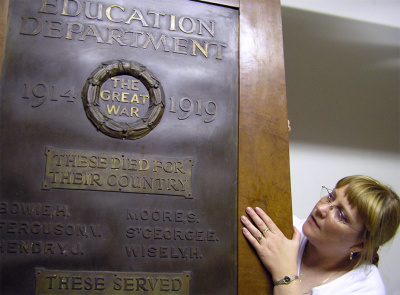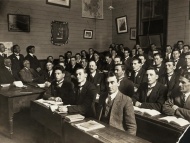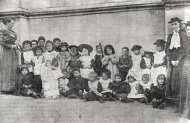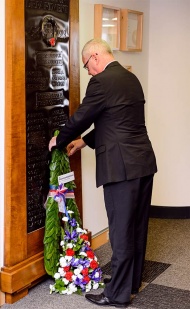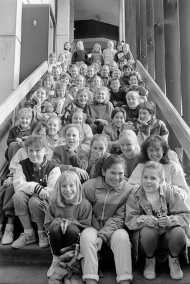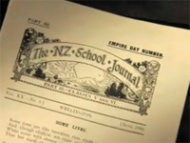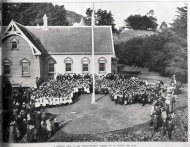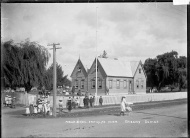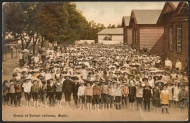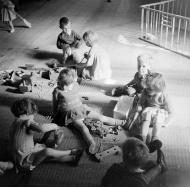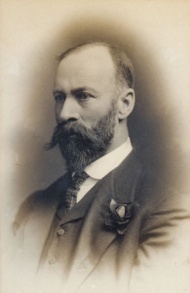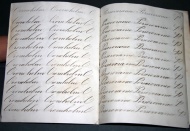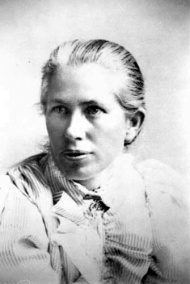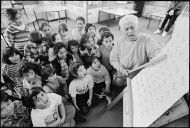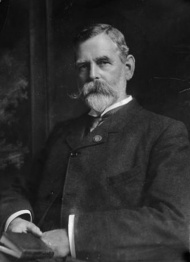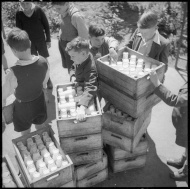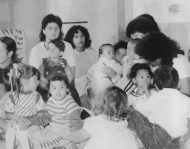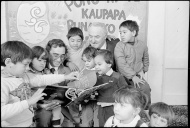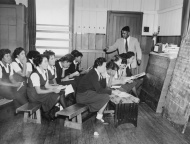Events In History
-
 1 July 1978Beatrice Tinsley made professor of astronomy at Yale
1 July 1978Beatrice Tinsley made professor of astronomy at YaleTinsley became the first woman to be appointed as Professor of Astronomy at Yale University in the United States Read more...
-
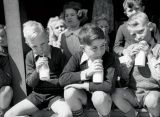 10 February 1967End of free school milk
10 February 1967End of free school milkNew Zealand schoolchildren received free milk between 1937 and 1967. The first Labour government introduced the scheme – a world first – to improve the health of young New Zealanders (and make use of surplus milk). Read more...
-
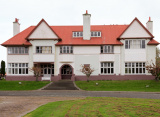 18 July 1924Flock House youth training farm opens
18 July 1924Flock House youth training farm opensThe governor-general, Viscount Jellicoe, officially opened Flock House station, near Bulls. This training farm was established using surplus profits from wool sales during the First World War. Read more...
-
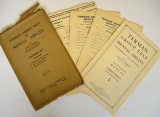 29 February 1924Intelligence tests arrive in New Zealand schools
29 February 1924Intelligence tests arrive in New Zealand schoolsFollowing a US study tour by Frank Milner, the rector of Waitaki Boys’ High School in Ōamaru, the Education Department began applying the Terman Group Test of Mental Ability to all first-year post-primary school students Read more...
-
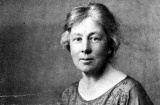 1 February 1922Correspondence School founded
1 February 1922Correspondence School foundedJanet Mackenzie became the first teacher in what was to become the Correspondence School for Back-block Children Read more...
-
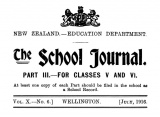 9 May 1907First School Journal published
9 May 1907First School Journal publishedNew Zealand pupils were for the first time able to read a schoolbook published in their own country. Read more...
-
 27 August 1904Foundation stone for Victoria University’s first building laid
27 August 1904Foundation stone for Victoria University’s first building laidVictoria College (now Victoria University of Wellington) was founded in 1897 to mark Queen Victoria's 60th jubilee. Until the opening of the Kelburn building in 1906, classes were taught in rented rooms. Read more...
-
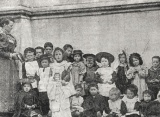 10 June 1889First kindergartens
10 June 1889First kindergartensThe first New Zealand kindergarten to educate children, in Dunedin, was based on the ideas of the German educationalist Friedrich Froebel. Read more...
-
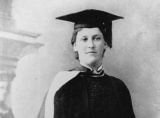 15 August 1881First woman Master of Arts in British Empire graduates
15 August 1881First woman Master of Arts in British Empire graduatesHelen Connon was the first woman in the British Empire to gain her Master of Arts degree. Her academic career started with edcuation in Dunedin, New Zealand. Read more...
-
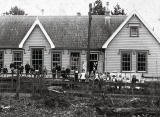 29 November 1877Education Act passed into law
29 November 1877Education Act passed into lawThe Education Act 1877 established free, compulsory and secular education for all Pākehā New Zealand children. Māori children could attend these schools if their parents wanted them to. Read more...
-
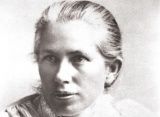 11 July 1877First woman graduates from a New Zealand university
11 July 1877First woman graduates from a New Zealand universityKate Edger became the first woman in New Zealand to gain a university degree and the first woman in the British Empire to earn a Bachelor of Arts (BA). Read more...
-
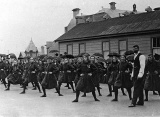 6 February 1871First public girls' secondary school
6 February 1871First public girls' secondary schoolThe first public girls’ secondary school in the southern hemisphere was Otago Girls’ High School, which opened eight years after the local public boys’ high school. Read more...
-
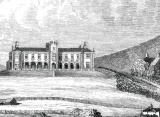 7 April 1856First state secondary school opens
7 April 1856First state secondary school opensThe first state secondary school in New Zealand, Nelson College, opened in temporary premises in Trafalgar St with a roll of just eight boys. It eventually attracted boys from around the country as well as the local area. It now has a roll of over 1000 and continues to take both boarders and day pupils. Read more...
-
 12 August 1816New Zealand’s first mission school opens
12 August 1816New Zealand’s first mission school opensThe simple building measured about 10m x 6m and included an area for Māori students to sleep and a cordoned-off platform for teachers and Pākehā students Read more...
Articles
Schools and the First World War

Schools and children were quickly called into action at the outset of the First World War in 1914. Developing patriotic, fit and healthy citizens was seen as important to the survival of the country and the Empire. Hundreds of teachers joined the NZEF, including many from sole-teacher schools. Almost 200 never returned.
-
Page 2 – Schools in 1914
The head of the Department of Education believed that ‘moral purpose should dominate the spirit of the whole school life.’ Schools and teachers were to shape children into
-
Page 3 – Displaying patriotism
In late 1917 district education boards ordered that children salute the New Zealand flag at the start of each school day. Some teachers opposed this as too militaristic.
-
Page 4 – The School Journal
During the First World War the New Zealand School Journal played an important role in encouraging patriotism, self-sacrifice, obedience and support for the war effort among
-
Page 5 – Turning boys into soldiers
The Defence Amendment Act 1900 introduced military cadet training into schools. The Defence Act 1909 made military training for nearly all boys compulsory from the age of 12
-
Page 6 – Supporting the war effort
During the war children were encouraged to be ‘cheerful’ and ‘helpful’, to ease the worry and sorrow of the mothers and wives of soldiers. There were also many practical ways
-
Page 7 – Teachers who served
Whether as school cadet officers or supporters of saluting the flag, teachers did much to set the moral tone of New Zealand schools before and during the war. Many hundreds
-
Page 8 – Further information
Links and books relating to schooling during the First World War
Te Wiki o Te Reo Māori - Māori Language Week
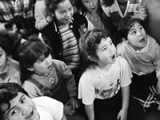
Every year since 1975 New Zealand has marked Māori Language Week - Te Wiki o Te Reo Māori. This is a time to celebrate te reo Māori (the Māori language) and to use more Māori phrases in everyday life. In 2018 Māori Language Week runs from 10-16 September.
- Page 2 - History of the Māori languageThe story of the decline and revival of the Māori language is one of the major issues in modern New Zealand
Children and adolescents, 1930-1960
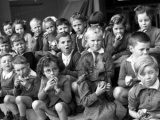
The need for the New Zealand government to promote national interests during the Depression and the Second World War created a renewed appreciation of the role of the family within society.
- Page 3 - Education By 1940 childhood was internationally recognised as a distinct stage in human development. A child's value to the family was no longer seen as primarily economic. Instead,
The Treaty in practice
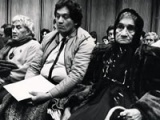
Amalgamating Māori into colonial settler society was a key part of British policy in New Zealand after 1840. Economic and social change, along with land-purchase programmes, were central to this process.
- Page 4 - Shared issues and approachesProspects for Māori looked bleak at the beginning of the 20th century. A shared sense of grievance emerged, and new leaders paved the way for new approaches to the
Missionaries
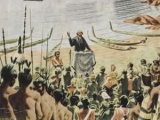
The Christian missionaries of the pre-1840s have been described as the 'agents of virtue in a world of vice', although they were not immune to moral blemish themselves.
- Page 3 - Men of vice or virtue?Thomas Kendall established the first mission school, but he was later suspended after admitting an adulterous affair with a Maori
Armistice Day
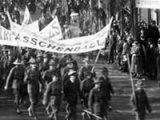
After four terrible years, fighting in the First World War finally ended with the signing of an armistice between Germany and the Allies on 11 November 1918. New Zealanders celebrated enthusiastically, despite having recently celebrated the surrenders of the three other Central Powers and the premature news of an armistice with Germany.
- Page 7 - New Zealand in 1918Some facts and stats about New Zealand in the year the First World War
Rolls of honour and obituaries
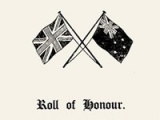
Government rolls of honour and obituaries published at the end of the First World War.
- Page 8 - Education service Roll of HonourRoll of honour for education service employees killed in the First World
Biographies
-
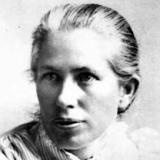 Edger, Kate Milligan
Edger, Kate Milligan
On 11 July 1877 Kate Edger (Evans) graduated with a BA in Latin and Mathematics from the University of New Zealand. She became the first woman in New Zealand to gain a university degree and the first woman in the British Empire to earn a BA
Read more... -
 Hogben, George
Hogben, George
In his time as head of the Department of Education from 1899 until 1915 George Hogben helped bring New Zealand's education system into line with the most advanced educational theory and practice of the time.
Read more...
Related keywords
- WW1 home front
- farming
- bulls
- waikato
- womens liberation
- science
- women
- cooking
- public service
- roll of honour
- wellington city
- teaching
- dunedin
- children
- universities
- anzac day
- trade unions
- 1980s
- WW1
- stratford
- primary schools
- te aroha
- suffrage 125
- famous firsts
- christchurch
- astronomy
- united states
- school journal
- flags
- opotiki
- missionaries
- casualties
- waihi
- statistics
- wellington college
- memorials
- fundraising
- victoria university
- george hogben
- nelson city
- cadets
- teacher
- eastbourne
- literature
- historical writing
- writing
- publishing
- lighthouses
- pencarrow head
- thomas kendall
- kate edger
- maori language
- te reo māori
- peace celebrations
- entertainment
- women in politics
- western front
- wellington cenotaph
- WW1 stories
- health
- drink
- temperance
- milk
- 1960s
- musket wars
- rangihoua
- cms
- christianity
- pre-1840 contact
- treaty of waitangi
- kotahitanga
- james carroll
- apirana ngata
- māori health
- child welfare
- maori
- battle of messines
- passchendaele offensive
- medals
- influenza pandemic
- housing
- armistice
- religion
- population
- alcohol
- six oclock swill
- adolescents
- social policy
- urbanisation
-
Rededication of Education Department roll of honour board

